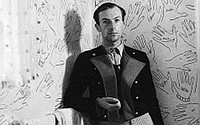| SHADOWS ON THE WALL | REVIEWS | NEWS | FESTIVAL | AWARDS | Q&A | ABOUT | TALKBACK | ||||
 Shadows off the beaten path Shadows off the beaten path | ||||
| Indies, foreigns, docs, revivals and shorts... | ||||
|
On this page:
A DEAL WITH THE UNIVERSE |
KING COHEN LOVE, CECIL | POSTCARDS FROM THE 48% < < D O C S > > last update 27.Jul.18 See also: SHADOWS FILM FESTIVAL | ||||
 R E V I E W B Y R I C H C L I N E
R E V I E W B Y R I C H C L I N E | ||||
A Deal with the Universe
| ||||
|
dir-scr Jason Barker prd Loran Dunn with Jason Barker, Tracey  release UK Mar.18 flare 18/UK BFI 1h30 
|  Tracing some 15 years in the life of a couple, this autobiographical documentary is sometimes startlingly raw, as filmmaker Jason Barker and his partner Tracey chronicle their yearning to have a child, which led to extraordinary decisions along the way. Assembled as a collection of home movies and video diary entries, the film never embellishes the story. And the honesty speaks to several big issues through a uniquely trans perspective.
Tracing some 15 years in the life of a couple, this autobiographical documentary is sometimes startlingly raw, as filmmaker Jason Barker and his partner Tracey chronicle their yearning to have a child, which led to extraordinary decisions along the way. Assembled as a collection of home movies and video diary entries, the film never embellishes the story. And the honesty speaks to several big issues through a uniquely trans perspective.
After 10 years together, Jason and Tracey begin the process to conceive a child, but after nearly 20 attempts, including two rounds of IVF, Tracey still isn't pregnant. And during this time, she also goes through a bout of breast cancer. So they decide to opt for Plan B: Jason comes off his hormone medication and begins ovulating again. Obviously, it's not that simple for a trans man to get pregnant, and the process requires unusual tenacity from both Jason and Tracey, not just personally but also from the people around them. The idea of a man giving birth to his son is a perhaps somewhat brain-bending for most audience members, and Barker speaks openly to the camera about his own journey, coming to grips with the nature of his own body, embracing his female anatomy and seeing through the eyes of others as he works through each step. Along the way, he also includes both anecdotes from his younger life and home video from his early years with Tracey, creating a vivid depiction of their relationship. The structure is a little offbeat, as it focusses almost entirely on the effort to conceive, including endless pregnancy tests, false hopes and repeated frustrations at each setback. And there's also rather a lot of footage of their cats as well as the pigeons that populate their balcony. But along the way, the story encompasses some fascinating elements, including Barker's hilariously astute stand-up performances and the couple's quirky homelife. The title refers to a pact Barker makes when he fears for the safety of his best friend. Perhaps shifting the balance of the film to feature more footage of him pregnant and then later with their son might have given the film a different emotional arc. The climactic montage of the baby over the first several years of his life is seriously lovely, although this final sequence also leaves one question hanging rather ominously in the air. Still, what the film says along the way about family, parenthood, gender and body consciousness is not only eye-opening, but also profound and provocative. And Jason and Tracey's internal journey is deeply moving. | |||
|
15 themes, language, imagery 26.Mar.18
| | |||
 R E V I E W B Y R I C H C L I N E
R E V I E W B Y R I C H C L I N E | ||||
King Cohen

| ||||
|
dir-scr Steve Mitchell prd Daniel McKeon, Steve Mitchell, Matt Verboys with Larry Cohen, Martin Scorsese, John Landis, Yaphet Kotto, Fred Williamson, Robert Forster, Eric Bogosian, Eric Roberts, Traci Lords, Michael Moriarty, Rick Baker, Joe Dante, JJ Abrams  release UK Aug.17 ff,
release UK Aug.17 ff, US 27.Jul.18 17/US 1h47 |
 Packed with anecdotes, this snappy documentary traces the career of Larry Cohen, the undisputed king of raw, visceral movies and TV. A long-time favourite of genre fans, Cohen has had a lasting impact on the industry at large, particularly in breaking down barriers for black actors. Resolutely working outside the system, Cohen has a filmography that's full of cult classics.
Packed with anecdotes, this snappy documentary traces the career of Larry Cohen, the undisputed king of raw, visceral movies and TV. A long-time favourite of genre fans, Cohen has had a lasting impact on the industry at large, particularly in breaking down barriers for black actors. Resolutely working outside the system, Cohen has a filmography that's full of cult classics.
Growing up in Manhattan, Cohen carried groceries to earn cash so he could go see virtually every movie that came out. While working as an NBC page he started handing out his scripts, selling his first project in 1963. From here he moved from TV serials to movies, constantly reinventing himself. To protect his work, he went on to direct and produce. And while his films are often dismissed as exploitation, they are full of social commentary and groundbreaking themes. But then to him, "every movie is exploitation!" A likeable everyman, Cohen says he never worried about rejection, because that meant what he wrote was original. And indeed, he waited years to re-submit scripts when their time had come. His bold, grounded storytelling make him the master of the concept, carefully maintaining menace and foreboding. And as a director, he uses locations as characters in his stories and writes great scenes on the spot. He is expert at brazenly stealing shots, filming in public places without permits and never taking himself too seriously. Mitchell's doc traces Cohen's career chronologically, while a range of interviews add personal perspectives. One of his most iconic movies was the low-budget 1974 monster-baby horror It's Alive, which plays on parenthood issues and features a great Bernard Hermann score. A huge hit, it spawned a franchise and a genre. And it emboldened Cohen to go further to push racial, religious and political boundaries. Or in the case of the killer-yogurt classic The Stuff (1985), consumerism. As one person observes, his movies were always about 10 years ahead of their time. Most mainstream filmgoers will have no idea who Larry Cohen is, and probably have seen few his films, yet blockbusters that audiences flock to owe a lot to him. This documentary is a treasure trove for cinema lovers, revealing backstage stories that are simply wonderful (Sam Fuller! Bette Davis!). Cohen is a remarkably confident filmmaker, still inventing new ways to tell stories and shoot movies, and never letting anyone tell him no. There's never been another filmmaker like him. And at 77, he still writes every day. | |||
|
15 themes, language, violence, sexuality 26.Jul.18 | ||||
 R E V I E W B Y R I C H C L I N E
R E V I E W B Y R I C H C L I N E | ||||
Love, Cecil

| ||||
|
dir-prd Lisa Immordino Vreeland with Cecil Beaton, David Bailey, David Hockney, Isaac Mizrahi, Leslie Caron, Nicki Haslam, Penelope Tree, Tim Walker, Mick Jagger, George Cukor, Truman Capote, Diana Vreeland  narr Rupert Everett
narr Rupert Everettrelease US 20.Jul.18 17/US 1h38 |
 Photographer, designer, illustrator and author Cecil Beaton is the subject of this lyrical documentary by filmmaker Lisa Immordino Vreeland. A visual feast, the film resonates with passion and emotion, augmented by pithy narration from Beaton's no-holds-barred diaries. It's an eye-catching exploration of a fascinating man who produced a vast quantity of unforgettable work.
Photographer, designer, illustrator and author Cecil Beaton is the subject of this lyrical documentary by filmmaker Lisa Immordino Vreeland. A visual feast, the film resonates with passion and emotion, augmented by pithy narration from Beaton's no-holds-barred diaries. It's an eye-catching exploration of a fascinating man who produced a vast quantity of unforgettable work.
"The visual really guides my life more than anything," says Beaton. Born in London, he studied history and art at Cambridge without going to any lectures; instead he staged elaborately artistic theatre productions with the Bright Young Things. As a dandy, his life was all about style. Through his photography, he pioneered the concept of capturing the essence of a person rather than straightforward portraits. And his iconic work for cinema is epitomised in 1965's My Fair Lady, for which he won two Oscars. This doc is gorgeously edited together from a treasure trove of photographs and footage, including filmed interviews with Beaton talking about his life and work. Diary entries (which Everett reads laced with wit), home movies and interviews explore his feelings as a young boy berated by his father for playing with his mother's makeup. He details his deep attraction to men who appear in his photos and paintings, acknowledging his sexuality and his futile attempts to change, but also his deep love for Greta Garbo. As Vreeland traces Beaton's life, she explores his impact on art and fashion. His photographs of actors helped create many of cinema's most iconic stars. And he certainly doesn't hedge from lashing out at those he despises. Indeed, his words often got him into trouble: he fought with colleagues and was fired from Vogue for a racial slur. But his exile gave him a chance to shoot portraits of the British royal family, leading to him becoming a war photographer during WWII, which in turn re-ignited his career. Fascinatingly, even in Beaton's war photography, it's clear that he's looking for beauty. This is a remarkable film about a man who, unable to express himself personally, used a variety of tools to create jaw-dropping imagery for the whole world. He admits that what kept him going was the challenge of doing things that seemed impossible, things that pushed him to grow. He may have been prickly and tricky, but he filled the world with glamour, elegance and grace for all of his 76 years. And he continues to inspire us to see the world through his eyes. In his words, "Be daring, be different, be impractical." | |||
|
PG themes, imagery 15.Jul.18
| | |||
 R E V I E W B Y R I C H C L I N E
R E V I E W B Y R I C H C L I N E | ||||
Postcards from the 48%

| ||||
|
dir-prd David Nicholas Wilkinson scr Emlyn Price, David Nicholas Wilkinson with David Wilkinson, Nick Clegg, AC Grayling, Bob Geldof, Vince Cable, Alastair Campbell, Ian McEwan, Patience Wheatcroft, Miriam Margolyes, Joan Bakewell, Femi Oyuwole, Ruth Cadbury  release UK 6.Jul.18
release UK 6.Jul.1818/UK Guerilla 1h49
|  Filmmaker David Wilkinson made this film to allow people across the UK to explain how they feel about Brexit. Carefully avoiding sensationalism, this is an honest, articulate attempt to find the facts in a situation that seems inexplicable. It's also a rather terrifying outline of just how devastating leaving the European Union will be for British people and businesses.
Filmmaker David Wilkinson made this film to allow people across the UK to explain how they feel about Brexit. Carefully avoiding sensationalism, this is an honest, articulate attempt to find the facts in a situation that seems inexplicable. It's also a rather terrifying outline of just how devastating leaving the European Union will be for British people and businesses.
The film opens with a demonstration by protesters who want to remain in the EU and are frustrated that their economy is being decimated, their futures taken from them, their identities diminished. When pro-Brexit politicians constantly speak about the "will of the nation", they are insulting half of the population. As Wilkinson observes, this was not a crushing landslide, but a win by the most narrow margin possible. And actually, less than a quarter of registered voters voted to leave. Wilkinson skilfully edits together comments by campaigners, celebrities and people on the streets. The most resonant sentiment is that this is a waste of time and resources at a time when Britain should be grappling with vital issues and leading the world. There's also the resounding sense that the campaign was so misleading that no one knew what they were voting for (aside from empty patriotism, every point made by the Leave campaign was a lie). Fully 80 percent of young people voted to remain, as they want to retain their rights to study, travel, work and live across Europe. This is a comprehensive, factual exploration of the issue, grappling with the referendum, its ramifications and the way the split vote has fractured British society. Wilkinson also travels through England, Scotland, Wales and Northern Ireland to talk about different voting patterns and the varying effects of leaving the EU, from the loss of farm subsidies to the thorny issue of an Irish border, which would terminate the peace treaty there. The film sometimes feels long, dipping into some perhaps less persuasive topics. But everything is urgent and important. The film never finds one positive thing about Brexit, but then neither has the UK government, which is charging headlong into it. Grayling carefully reminds us that in its own wording, the referendum was meant to be advisory only, not binding, and yet the pro-Brexit members of the government have called it mandatory. So it's no wonder that people are in open rebellion. By leaving the wealthiest single market in the world, Britain will be poorer, weaker and have a diminished voice on the world stage. Period.
PG themes, language | 8.Jul.18 

See also: SHADOWS FILM FESTIVAL © 2018 by Rich Cline, Shadows
on the Wall
| ||